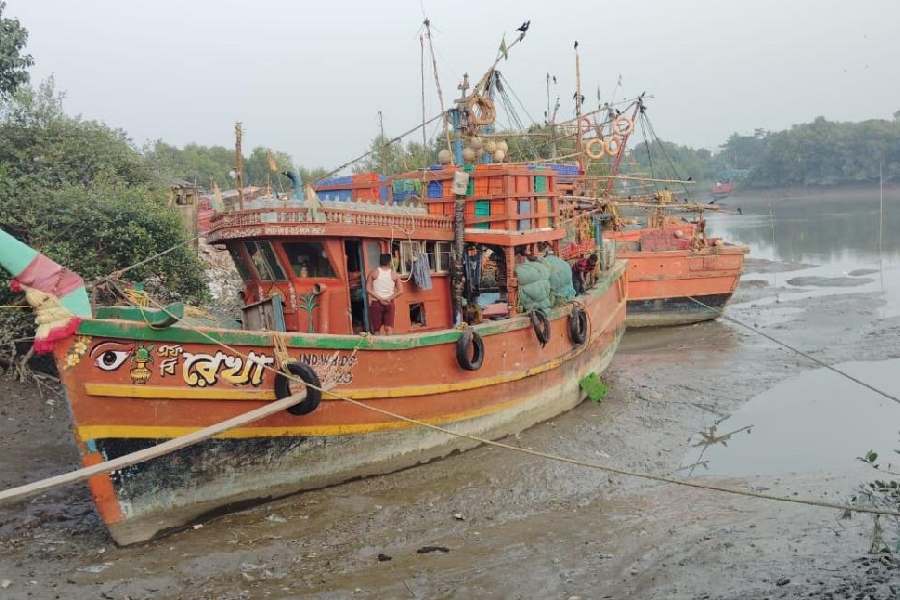The catch of exotic fish varieties such as eels, silver pomfret and prawn has significantly declined as fishermen in Bengal are now avoiding fishing near the India-Bangladesh Maritime Boundary Line (IMBL) fearing detention by the neighbouring country’s coast guards.
“Our fishermen go near the IMBL because it is closer to the Swatch of No Ground (SoNG), a natural sanctuary that is home to various export-quality fish like eels and white prawn,” said Satinath Patra, the secretary of the Sundarbans Samudrik Matshyojibi Shramik Union, an association of fishermen from South 24-Parganas.
The SoNG is a 14km-wide trench in the Bay of Bengal, located 30km from the Dublar Char island in the Bangladesh Sunderbans. It is known as a treasure trove of marine life. Although fishermen can’t fish in the deep submarine canyon, flocks of exotic fish are available in nearby pockets.
Multiple fishermen said they used to get a good catch of export-quality fish from the areas adjacent to the IMBL, as it is close to the SoNG. Catching exotic fish is very profitable because of the high demand in international markets.
“After the Bangladesh Navy and the Bangladesh Coast Guard arrested 79 fishermen in October, who are still in jail in the neighbouring country, fishermen from Bengal are no longer willing to take the risk. The fear has become more relevant amid the declining relationship between the two countries,” he added.
The Bangladesh Navy arrested 31 fishermen from Bengal and seized two boats — FB-Ma Basanti and FB-Jay Jagannath — on October 13. They were handed over to Kolapara police in the neighbouring nation and are currently lodged in Patuakhali Jail, awaiting legal clearance.
In the following three to four days, the Bangladesh Coast Guard detained three additional fishing boats — FB-Abhijit, FB-Abhijit3, and FB-Narayan — and arrested 48 more individuals. They were handed over to Mongla police in Bangladesh. The primary charge against all those fishermen was “entering Bangladeshi waters” by crossing the IMBL.
Chief minister Mamata Banerjee, on the floor of the Assembly, expressed concern about the detained fishermen and claimed that the state government had provided legal support to them.
A source said the arrested fishermen, mostly from South 24-Parganas, would be produced in the Bangladesh court again on December 30 and January 9.
According to exporters, the supply of those exotic fish has drastically declined because of the political upheaval in Bangladesh following the ouster of the Sheikh Hasina government.
A trader, Joydeb Hati, told The Telegraph: “We are just sitting with crossed fingers because of the lack of supply of export-quality fish like eels and prawns. Despite high demand for such fish in Japan, China, the US and various European nations, we can’t do good business because of the lack of supply.”
Silver pomfret, Chinese pomfret, eels, yellow eels, black eels, white prawns and tiger prawns are sold in the wholesale market at prices ranging from ₹800 to ₹1,500 per kg, depending on size and quality.
“The fishermen are bringing in only common local fish, which are not of export quality. I can say the business has declined by 75 per cent in the past three months,” added Hati.
A source has said approximately 2,500 fishing boats are used by fishermen from South 24-Parganas. The fishermen said when they used to fish near the adjacent pockets of the IMBL, they could catch exotic fish worth ₹5 lakh every week.
“Currently, we are catching only local fish, and the total amount of seafood
we collect is not worth more than ₹1.5 lakh a week,” said a fisherman from Kakdwip.
India and Bangladesh share a coastline border of around 737km. Following controversy over crossing maritime boundaries by fishermen from both countries, the then Bangladesh Prime Minister Sheikh Hasina took the initiative, and the two countries settled their maritime boundary dispute in 2014 following a verdict of the Permanent Court of Arbitration (PCA) at The Hague.
The PCA is an intergovernmental organisation established in 1899 that provides a range of dispute-resolution services to the international community or two countries.











